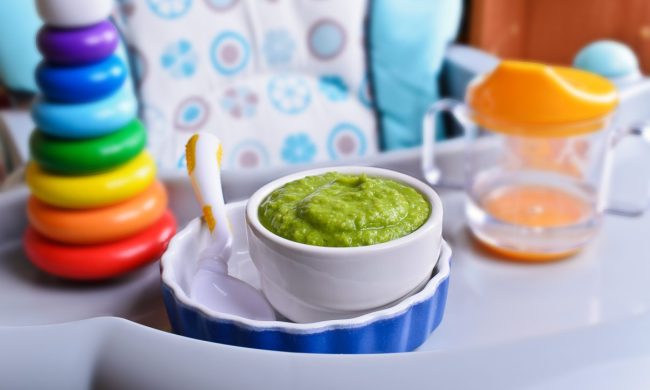Introducing solid foods to your baby is an exciting time. It’s a milestone that may go smoothly for some, but not quite as simple for others. If your little one wants nothing to do with these new foods, you may desperately be looking for answers as to why they’re refusing solid food options.
We know that sourpuss not-having-it face all too well. And if that mini-me of yours wants nothing to do with the spoon, the bib, or the puree in front of them, a power struggle will ensue — and, spoiler alert: You are not going to win. Nevertheless, it can be distressing for parents when their little bottle-chugging sweetheart goes on a solids strike (or incessantly spits, gags, and cries!). Fortunately, it’s usually not a cause for concern: there could be several factors at play to cause the issue of baby refusing solid foods. Here are a few common reasons why your baby might be rejecting your feeding attempts — and some gentle ways to coax them to eat a bit more.
Baby is just not ready yet

Most pediatricians recommend introducing solids sometime between 4 and 6 months. You may be on pins and needles, ready to start spoon-feeding your little sweetheart, but you want to make sure Baby is ready before you thrust a spoonful of carrot puree into their mouth. If your infant is able to hold their head up, has lost the tongue-thrust reflex, and shows a general interest in food, it may be the right time. If not, you might want to hold off a little longer.
What’s more, a young infant’s intestinal tract might not be ready for food yet — so don’t push it and don’t panic. Baby gets all the necessary nutrition from your breast milk or formula. Wait a little while and try again.
Baby feels full and satisfied

If your baby chugs bottles or loves the boob, they might not feel hungry when mealtime rolls around. An infant’s tummy is still tiny, after all, and it can’t hold that much liquid or food. Try to strategically offer solids between formula feedings or nursing sessions. The key is: You don’t want Baby to be too full or too hungry (they’ll just end up frustrated). It’s a delicate balance, so be patient and try to find a time frame that works into your routine — and theirs.
Baby doesn’t like the texture or taste

This is all very new to your little one. The texture of baby food can seem weird, different, and confusing at first. If you notice your baby gagging, it’s probably because they are adjusting to the strange mixture lingering in the back of their mouth. For the first few weeks of feeding, you may want to stick with a smooth and creamy texture; avoid too much chunkiness or thickness.
It’s also possible your baby doesn’t like the flavor of the food you’re offering. Don’t worry; not all hope is lost if your infant refuses spinach for the first few attempts. It can take 12 to 15 tries for your baby to adjust to a flavor and learn to like it — so keep at it. If they turn their nose up at the spoon, let it go and pick up where you left off another day. Patience is the key to helping your eager eater accrue an adventurous palate.
Baby is tired and cranky

Is your baby crying while eating solids? It might be time for a nap. Infants are fickle. If your love bug needs more Zzz’s, is at the teething stage, has a cold, or just feels like being fussy (hey, we all have our moments), it’s probably not a good time to even attempt a spoon feeding — especially if your babe has refused solids in the past. Avoid the struggle (it’s real!) and wait until your cranky itty-bitty is well-rested and happy. A content baby is much more likely to comply.
Baby is too distracted

As your baby gets older, the world around them becomes much more exciting. There’s so much to do, see, and explore (P.S. — have you babyproofed yet?). Your active and excited munchkin might not want to be trapped in the high chair for more than a minute or two — they’ve got other way more pressing things to take care of.
Set a calming scene for mealtime to help curb these distractions. Turn off the television, ask older siblings to practice quiet time, and try to focus on making a sit-down meal fun and engaging for your baby.
Baby wants to assert some independence

They grow up so fast, don’t they? You may be surprised to learn that your very needy little one wants to break free and assert some independence. This often occurs as a baby begins to master certain milestones — pulling up, crawling, rolling over, standing, etc.
In this same vein, your baby might not want you to feed them at all. Rather, an infant might want to hold, scoop, and shovel. Of course, a 5-month-old is not an autonomous creature. But if you’re brave enough to give your control-craving cutie a spoon, they might feel more empowered to try solids. (Just keep the paper towels nearby.)
You could also consider trying baby-led weaning. This method of feeding skips purees and spoons altogether. Instead, you offer all sorts of finger foods an infant can feed themselves. Thus, Baby takes the reins and controls their own feeding destiny.
How to introduce solids

Once you’ve determined that your baby is ready to try solid foods, it’s time to decide which food you’ll introduce first. Your parents may have started their babies on infant cereal, but the AAP has since stated that solid foods can be introduced in any order, and you don’t need to start with infant cereal. If you do choose to start your little one off with a baby cereal, make sure to select one that is fortified instead of just rice cereal.
Also ensure the food you introduce is soft or pureed to avoid any choking hazards, and only introduce a new food once every 3-5 days. Infants with severe eczema or a fish allergy may be prone to a peanut allergy, so make sure you consult your doctor before introducing solids if that is the case for your baby. Before you know it your baby will be ready to move up to finger foods and will get excited every time they get to taste something new.
Whatever the reason for your baby’s reluctance to accept solids, it’s important for you to remember that this stage will pass. Eventually, your tiny nugget will learn to like food. Try not to stress. Of course, if you have specific concerns or think there could be a medical issue at play, talk to your pediatrician. And, in the meantime, keep trying — you and your baby will get the hang of this whole solids thing sooner or later.



